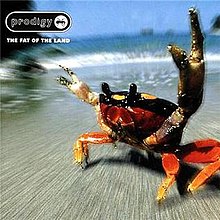The Fat of the Land
| The Fat of the Land | ||||
|---|---|---|---|---|
 |
||||
| Studio album by The Prodigy | ||||
| Released | 30 June 1997 | |||
| Recorded | 1995–97 | |||
| Studio |
|
|||
| Genre | Big beat | |||
| Length | 56:24 | |||
| Language | English | |||
| Label |
|
|||
| Producer | Liam Howlett | |||
| The Prodigy chronology | ||||
|
||||
| Singles from The Fat of the Land | ||||
|
||||
| Professional ratings | |
|---|---|
| Review scores | |
| Source | Rating |
| AllMusic | |
| Entertainment Weekly | B |
| The Guardian | |
| Los Angeles Times | |
| NME | 8/10 |
| Pitchfork Media | 7.9/10 |
| Q | |
| Rolling Stone | |
| The Rolling Stone Album Guide | |
| Spin | 7/10 |
The Fat of the Land is the third studio album by English electronic dance music group The Prodigy. The album was released by XL Recordings on 30 June 1997 and on 1 July 1997 in the United States by Maverick Records.
The album has received critical acclaim and has sold over 10 million copies worldwide as of 2012.
The album title comes from the old English phrase 'living off the fat of the land', which means living well or being wealthy.
The band name was shortened to simply "Prodigy" for the release and its singles.
While Liam Howlett is generally responsible for the compositions and Maxim Reality is featured on two tracks, this is the first record to include contributions by Keith Flint, who provides vocals on four of the songs.
The album debuted at number one on the US Billboard 200 chart. The album has since gone double platinum, selling over two million copies in the US.
The album also caused some controversy. The National Organization for Women objected to the seeming misogyny of "Smack My Bitch Up", though the band maintains that its true interpretation is "doing anything intensely".
In 1999, the album entered the Guinness World Records as the fastest-selling UK album and was also nominated for the Grammy Award for Best Alternative Music Album.
It has been featured in a number of music publication lists:
The album is included in the book 1001 Albums You Must Hear Before You Die. The album was also nominated for the 1997 Mercury Music Prize.
In 2004, KISS co-founder Gene Simmons covered "Firestarter" on his second solo album, Asshole. "Firestarter" was also covered by Sepultura on their album Kairos, and by Jimmy Eat World on their Firestarter (EP).
...
Wikipedia
